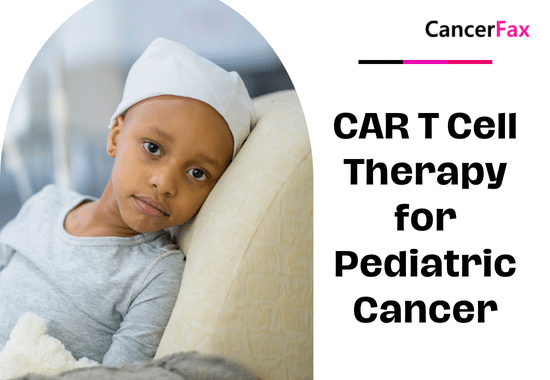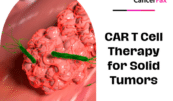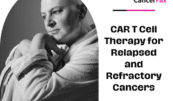CAR T Cell Therapy for Pediatric Cancer
Introduction
Although relatively rare, pediatric malignancy is one of the leading causes of mortality in children worldwide. Even though traditional therapies like chemotherapy, radiation, and surgery have improved survival significantly, such treatments are often linked to serious side effects and are poorly effective in refractory/relapsed settings.
CAR T cell therapy has been a nascent yet very promising new treatment for pediatric cancers, offering a last hope to patients who have so far shown no response to the use of conventional therapies. The paper reviews the application of CAR T cell therapy in pediatric malignancies with respect to successes, challenges, and future directions.
Understanding Pediatric Cancer
Biological characteristics and responses to treatment vary significantly between pediatric and adult cancers. Pediatric cancers correspond to leukemia, lymphoma, brain tumors, neuroblastoma, and sarcomas. Leukemia is the most common cancer in children, with acute lymphoblastic leukemia (ALL) being the most prevalent type.
CAR T Cell Therapy in Pediatric Acute Lymphoblastic Leukemia (ALL)
Success Stories and Case Studies
FDA Approval: Kymriah (tisagenlecleucel) is the first gene-edited therapy and the first chimeric antigen receptor T cell therapy approved by the FDA for the treatment of pediatric and young adult patients affected by relapsed or refractory B-cell ALL, in 2017.
Clinical Results: According to available clinical trials, CAR T cell therapy can result in high rates of remission in the pediatric patient population that has ALL. Within the ELIANA trial, an overall remission rate of 81% was captured, with the majority of those patients achieving complete remission.
Mechanism of Action
Target Antigen: CAR T cells for ALL are targeted against the CD19 antigen, a surface protein on normal and malignant B cells. The gene-modified CAR T cells will recognize and bind to this CD19, mediating the destruction of the cancer cells.
Response of the Immune System: When the target antigen binds to the CAR T cells, they become activated, multiply, and release molecules that kill leukemia cells.
Challenges and Limitations
Side Effects: The severe side effects of CRS and neurotoxicity are common and require proper precautions.
Relapse: Some people have a relapse due to the loss of CD19 antigen on the surface of leukemia cells, a process known as antigen escape.
Other Pediatric Cancers
Neuroblastoma:
Current Research and Clinical Trials: Neuroblastoma is a cancer originating from nerve tissue that is being researched as a target for CAR T cell therapy. One potential target identified in neuroblastoma cells is the surface antigen GD2. The preliminary results of early-phase clinical trials targeting GD2 are promising.
Teaching Point: The dense stroma and immunosuppressive environment of neuroblastoma tumors present challenges to CAR T cell infiltration and efficacy.
Brain Tumors
Current Research and Clinical Trials: CAR T cells are being investigated for the treatment of pediatric brain tumors, including medulloblastoma and glioblastoma. Some targets under investigation include HER2 and EGFRvIII.
Challenges: The blood-brain barrier and the particular microenvironment of brain tumors raise difficult obstacles to CAR T cell therapy.
Expanding Applications
Lymphomas:
CAR T cell therapy is being studied in pediatric Hodgkin and non-Hodgkin lymphomas, which include the antigens CD19 and CD30 as targets in these malignancies.
Overcoming Challenges of CAR T Cell Therapy in Pediatric Cancers
Side Effect Management
Cytokine Release Syndrome
This is associated with life-threatening massive cytokine release; management involves an anti-IL-6 receptor antibody, like tocilizumab, and corticosteroids to combat the symptoms.
Neurotoxicity
Confusion, seizures, and encephalopathy are neurological side effects managed by supportive care and corticosteroids.
Addressing Relapse and Antigen Escape
Dual-Targeting CARs: To circumvent antigen escape, the development involves CAR T cells targeting multiple antigens. Examples include targeting CAR T cells that hit both CD19 and CD22.
Next-Generation CARs: Development of the next generation of CARs with enhanced persistence and in vivo efficacy could reduce the risk of relapse.
Efforts to Enhance Efficacy in Solid Tumors
Armored CAR T Cells: Second-generation CAR T cells can be engineered to secrete cytokines or to express costimulatory molecules, thereby overcoming the immunosuppressive tumor microenvironment.
Combination Therapies: Combination of CAR T cell therapy with a variety of therapies like chemotherapy, radiation, or immune checkpoint inhibitors has shown improved efficacy in solid malignancies.
LIST OF CAR T CELL THERAPIES AVAILABLE IN THE MARKET WITH THEIR PRICE IN RESPECTIVE COUNTRIES (USD)
|
||||||
| S.No. | CAR T-Cell therapy | Brand Name | Company | Disease | Country | Cost |
| 1 | Tisagenlecleucel | Kymriah | Novartis | BALL / Lymphoma | USA | 500-800,000 |
| Singapore | 400-500,000 | |||||
| South-Korea | 400-500,000 | |||||
| China | 400-500,000 | |||||
| Australia | 400-500,000 | |||||
| Israel | 400-500,000 | |||||
| 2 | Idecabtagene vicleucel | ABECMA® | BMS | Multiple-Myeloma | USA | 500-800,000 |
| Singapore | 400-500,000 | |||||
| South-Korea | 400-500,000 | |||||
| China | 400-500,000 | |||||
| Australia | 400-500,000 | |||||
| Israel | 400-500,000 | |||||
| 3 | Lisocabtagene maraleucel | BREYANZI® | BMS | DLBCL | USA | 500-800,000 |
| Singapore | 400-500,000 | |||||
| South-Korea | 400-500,000 | |||||
| China | 300-400,000 | |||||
| Australia | 400-500,000 | |||||
| Israel | 400-500,000 | |||||
| 4 | Ciltacabtagene autoleucel | CARVYKTITM | Janssen Biotech (J&J) | Multiple-Myeloma | USA | 500-800,000 |
| Singapore | 400-500,000 | |||||
| South-Korea | 400-500,000 | |||||
| China | 250-300,000 | |||||
| Australia | 400-500,000 | |||||
| Israel | 400-500,000 | |||||
| 5 | Axicabtagene ciloleucel | YESCARTATM | Kite Pharma | DLBCL | USA | 500-800,000 |
| Singapore | 400-500,000 | |||||
| South-Korea | 400-500,000 | |||||
| China | 250-300,000 | |||||
| Australia | 400-500,000 | |||||
| Israel | 400-500,000 | |||||
| 6 | Equecabtagene Autoleucel | FUCASO | IASO Biotechnology | Multiple-Myeloma | China | 250-300,000 USD |
| USA | 500-800,000 | |||||
| 7 | Zevorcabtagene autoleucel | Zevor-Cel | Carsgen | Multiple-Myeloma | China | 250-300,000 USD |
| USA | 500-800,000 | |||||
| 8 | CAR T Cell therapy | Trials | Multiple companies | BALL | China | 75-90,000 |
| DLBCL | China | 75-90,000 | ||||
| Multiple Myeloma | China | 75-90,000 | ||||
| Auto-immune disorders | China | 75-90,000 | ||||
| TALL | China | 75-90,000 | ||||
| 9 | CAR T Cell therapy | NexCAR19 | Immunoact | BALL / DLBCL | India | 60,000 |
Future Directions
Next-Generation CAR T Cells
Improved Design: Next-generation CARs are being developed that have improved signaling domains and safety features to enhance efficacy while reducing toxicity. Universal CAR T cells are being investigated as off-the-shelf CAR T cells, which would need no patient-specific modifications, to enhance access and reduce costs.
Combination Therapies
Synergistic Approaches: This may require combination approaches wherein CAR T cell therapy is combined with other treatments either checkpoint inhibitors, chemotherapy, or radiation—to produce synergy and overcome resistance.
Immune Modulation: Strategies to manipulate the immune system with oncolytic viruses or to deplete certain immunosuppressive cells are being explored to maximize CAR T cell function.
Expanding Applications
Solid Tumors: In solid tumors, studies in developing appropriate targets and overcoming some unique challenges in the tumor microenvironment will extend CAR T cell therapy.
Other Diseases: Besides cancer, CAR T cells have been looked into for infectious diseases and autoimmune disorders, reflecting the extremely wide scope of this new therapeutic platform.
Conclusion
Through several clinical trials, CAR T-cell therapy has shown much promise for pediatric cancers, specifically relapsed or refractory ALL. Challenges still remain, but ongoing research and new strategies are continually improving the efficacy and safety of this therapy.
A reasonably bright future seems to be ahead of chimeric antigen receptor T cell therapy in pediatric malignancies, with prospects for better outcomes and more durable remissions for increasing numbers of patients. Indeed, as the field progresses, so shall CAR T cell therapy stand as a beacon for the power of immunotherapy against cancer, giving young patients and their families new hope.
Susan Hau is a distinguished researcher in the field of cancer cell therapy, with a particular focus on T cell-based approaches and cancer vaccines. Her work spans several innovative treatment modalities, including CAR T-cell therapy, TIL (Tumor-Infiltrating Lymphocyte) therapy, and NK (Natural Killer) cell therapy.
Hau's expertise lies in cancer cell biology, where she has made significant contributions to understanding the complex interactions between immune cells and tumors.
Her research aims to enhance the efficacy of immunotherapies by manipulating the tumor microenvironment and exploring novel ways to activate and direct immune responses against cancer cells.
Throughout her career, Hau has collaborated with leading professors and researchers in the field of cancer treatment, both in the United States and China.
These international experiences have broadened her perspective and contributed to her innovative approach to cancer therapy development.
Hau's work is particularly focused on addressing the challenges of treating advanced and metastatic cancers. She has been involved in clinical trials evaluating the safety and efficacy of various immunotherapy approaches, including the promising Gamma Delta T cell therapy.
- Comments Closed
- August 5th, 2024






CAR-T clinical trials for kids, CAR-T for pediatric tumors, CAR-T therapy for children, Childhood leukemia CAR-T, Childhood lymphoma treatment, Kids' cancer breakthrough, Pediatric cancer immunotherapy, Pediatric oncology advances
With a proven success rate exceeding 90%, we offer cutting-edge, state-of-the-art, cost-effective CAR T-cell therapy for all types of pediatric cancer.
Please share your medical records via WhatsApp or email us at info@cancerfax.com to receive a detailed treatment plan and cost estimate.
Chat with Susan to learn more >